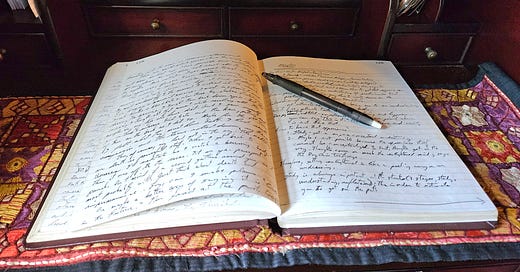“I’m hoping to be astonished tomorrow by I don’t know what.” Jim Harrison
So what in writing about my meditation translates to writing stories?
When sitting meditation, contemplating helpful moral scaffolding like the Four Reminders and the Six Paramitas, or emptying the mind by watching our breath, sometimes insights pop into our heads. These are often helpful and surprising. We want these, and we want the same in writing fiction.
So let’s make a rule.
When writing fiction, always make surprising yourself a goal! Writing to be read is a kind of a performance, and performance demands energy. Surprise and delight are the evidence that you are writing with energy. Whenever you sit down to work, you have to aim at surprising or delighting yourself with what pops out of you and onto the page. That’s the rule.
These gifts are often small things, clever turns of phrase or vivid images, discoveries about the characters, or about the direction of the story. You don’t have to rush-write nonsense hopping to trip over inspiration, but you should mostly be on the edge of your seat. Not always, but mostly.
If you don’t surprise and delight yourself, how will you make a reader perk up? Flannery Connor said it best: “You ought to be able to discover something from your stories. If you don’t, probably nobody else will.”
In other words, always bring spirit to the writing desk. When the spirit is awake, we are most ourselves, so do whatever you must beforehand to arouse your animal spirits. The energy you project may be a rip-roaring, fire-breathing rollick or it may be of a quiet, lyrical kind. It may be a comic energy—or that of a dark, gothic storyteller, a voice out of the shadows. Let it out and always surprise and delight yourself with it.
Here are a few examples of moments that surprised me in the stories I’ve posted so far in this newsletter. Go to Monthly: Fiction at the top of the page to look for them.
In “The Sandwich Shop,” posted in April, I described a homebody, obsessively do-it-yourselfy handyman husband. When the time came in the story to describe how he kissed his wife, even how she perceived him having sex with her, I burst out laughing at what I found myself writing. How she perceives him in these moments turned out to be key to how the story came out. Don’t ask me where this small twist came from. It was a total surprise.
Sometimes the surprise can come from a long forgotten image. How Charles in “A Hungry Ghost” moves is based on an image of an old friend who I hadn’t thought of for decades, yet in the midst of writing the story it popped out of my head in the form of a sentence. I’d never articulated the image in that way before. His speech pattern and how he moved were little surprises among many others in that story.
The climax of “Evening on the Plaza” ambushed me. I thought the story would go on longer, but then the story itself presented me with its climax and ending. It shook its head at me and said, “No. You don’t go on from here. It ends here with the dogs. Do this.” Surprised and frankly delighted, I obeyed. When I looked back at what had happened, I could see that all the elements were there beforehand. I just didn’t see them until the morning I sat down to continue, and then BOOM!—there it was. Surprise, that’s your ending!
Who knows where any of this comes from really. Inner well of silence? The collective consciousness? When we sit down to write, we toggle between consciously working a craft and opening our imaginations as in meditation. I once said to a silent, stone-faced response in a graduate seminar that art is inspired craft. That’s about as good a definition as I’ve heard. We have to start by knowing our craft, but beyond that is an act of faith, which means opening ourselves to possibility, embracing the spirit we bring to the craft of writing.
A NOTE ABOUT THESE ESSAYS
I never wanted to write about writing. Especially about my writing. I just wanted to write. But maybe, just maybe, the time has come. Maybe my experience learning how to craft a story will be helpful to you in some way. I certainly hope so.
Nothing here is the last word. Some of it may translate directly to what you need in order to be a better story writer. Most of it will be a jumping off point for your own thinking. All of it is simply my take, but I am confident enough of what I have learned to offer these thoughts as a way to get you thinking about this literary form that I love so much. Meet me here on Wednesdays and please subscribe now to show your support. IT IS FREE.



